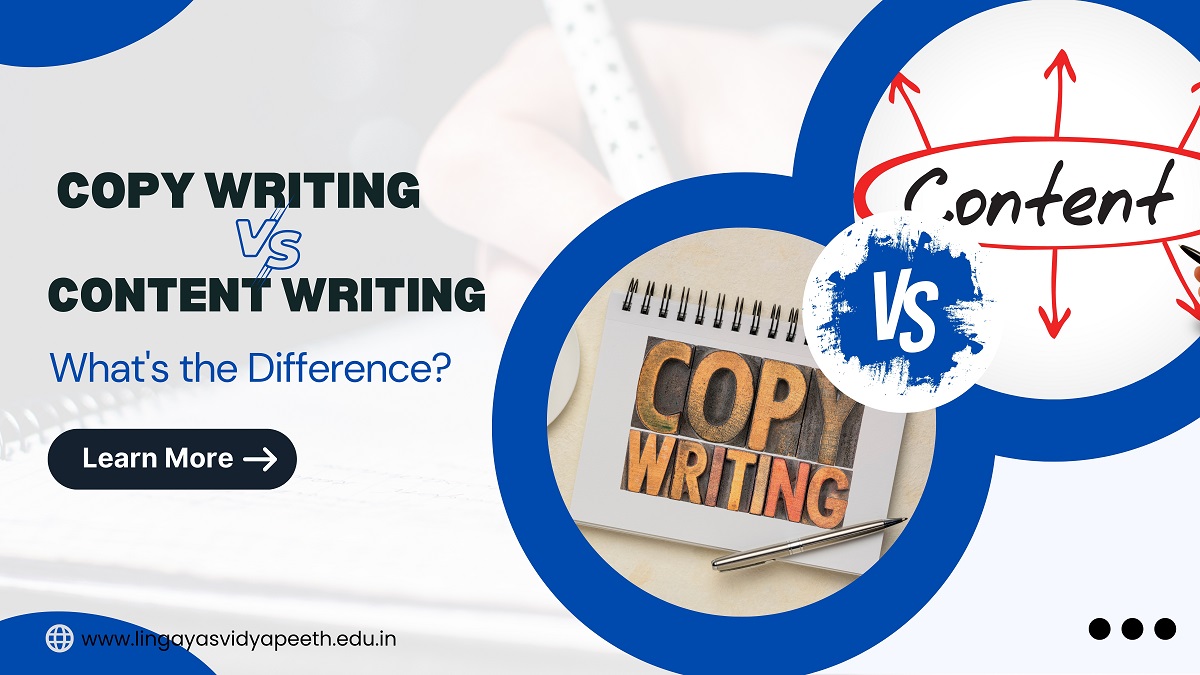Home » Copywriting vs. Content Writing: What’s the Difference?

Hey there, students! Have you ever wondered what makes an ad catch your eye or a blog post keep you hooked? That’s the magic of writing—but not all writing is the same. Two popular types, copywriting and content writing, are often confused, yet they serve different purposes. In 2025, the digital marketing world is growing rapidly, expected to hit $786 billion by 2026 (Statista, 2024).
Both copywriting and content writing are key players in this growth, offering exciting career paths for creative minds like yours. Whether you’re dreaming of crafting catchy slogans or informative blog posts, this guide will break down the differences, benefits, and how you can kickstart your journey with Lingaya’s Vidyapeeth. Let’s dive in!
Copywriting is all about writing to sell or persuade. It’s short, punchy, and designed to grab attention and spark action—like buying a product, signing up for a newsletter, or clicking an ad. Copywriters use emotional triggers, simple words, and clever phrases to connect with readers instantly.
Imagine a social media ad for a new phone:
“Unleash Your World with the Galaxy X! Stunning camera, lightning-fast speed—grab yours now and get 20% off!”
This ad is short, exciting, and pushes you to buy with a discount offer.
Lingaya’s Vidyapeeth provides a BBA in Digital Marketing, excellent for learning to write catchy copy to boost sales.
Content writing focuses on informing, educating, or entertaining. It’s about building trust and keeping readers engaged over time, often through blog posts, articles, or e-books. Content writers aim to provide value, answer questions, or tell stories without directly pushing for a sale.
Here’s a snippet from a blog post:
“Want to ace your exams? Start by creating a study schedule. Break your subjects into small chunks, and reward yourself after each session. Studies show that 25-minute study blocks boost focus by 30% (Pomodoro Technique, 2023).”
This piece informs students without selling anything directly.
Lingaya’s Vidyapeeth offers a Bachelor of Arts in Journalism and Mass Communication and Bachelor of Arts (Honours) in English, both ideal for mastering content writing skills.
Here’s a clear table to compare the two:
| Aspect | Copywriting | Content Writing |
| Purpose | Persuade or sell (e.g., ads, emails) | Inform or engage (e.g., blogs, articles) |
| Tone | Persuasive, emotional, urgent | Informative, friendly, conversational |
| Length | Short (50–300 words) | Longer (500–2,000+ words) |
| Goal | Drive immediate action (e.g., buy now) | Build trust and educate over time |
| SEO Focus | Moderate (keywords for ads) | High (rank on Google) |
| Audience | Targeted buyers | General readers or niche audience |
| Examples | Slogans, social media ads, product pages | Blog posts, e-books, how-to guides |
| Lifespan | Short-term (e.g., campaign-based) | Long-term (e.g., evergreen content) |
| Skill Focus | Emotional triggers, CTAs | Research, storytelling, SEO |
| Metrics | Conversion rates, clicks | Traffic, engagement, dwell time |
Both fields are open to beginners, but education helps you stand out. Here are some paths:
Anyone with a passion for writing can succeed! You don’t need a degree, however skills like creativity, research, and clear communication are key which you can learn in some academic program. Students with strong English skills, curiosity, and a knack for storytelling are ideal. If you love persuading people, copywriting might be your fit. If you enjoy explaining ideas, content writing could be your path.
AI tools like ChatGPT can generate text, but they lack human creativity and emotional connection. In 2025, 82% of marketers say human writers are still essential for authentic content (Content Marketing Institute, 2024). AI can assist with drafts or ideas, but it can’t replace the unique voice and strategy humans bring. Your creativity is safe!
Both fields offer exciting opportunities:
The demand for both is growing, with 65% of companies planning to increase content budgets in 2025 (HubSpot, 2024). With skills from Lingaya’s Vidyapeeth, you can land these roles or freelance globally.
Lingaya’s Vidyapeeth is your launchpad to a writing career. Their courses are designed for students like you, blending theory with hands-on practice:
With experienced faculty, modern facilities, and industry connections, Lingaya’s prepares you for real-world success. Their programs emphasize practical skills like SEO, audience research, and creative writing, ensuring you’re job-ready.
Ready to start? Visit Lingaya’s Vidyapeeth’s official website and follow these steps:
For more information contact the admission department.
Copywriting and content writing are two sides of the same coin—both powerful, creative, and in demand. Whether you want to craft ads that sell or blogs that inform, there’s a path for you. With Lingaya’s Vidyapeeth, you’ll gain the skills, confidence, and portfolio to shine in 2025 and beyond.
Also Read
Difference Between Structure and Union
Difference Between Psychology and Sociology
Difference Between Machine Learning and Deep Learning
Difference Between Pharmacy and Paramedical
Difference Between Sales and Marketing
From
Lingaya’s Vidyapeeth
Best University in Faridabad
RECENT POSTS
CATEGORIES
TAGS
Agriculture Agriculture future AI Architecture artificial intelligence Bachelor of Commerce BA English BA Psychology BTech AIML BTech CSE BTech cybersecurity BTech Engineering Business management career Career-Specific Education career guide career option career scope Civil engineering commerce and management Computer Science Computer science engineering Data science degree education Engineering Engineering students English Literature english program Fashion Design Fashion design course Higher Education Journalism journalism and mass communication law Law career Machine Learning mathematics MBA MBA specialization Mechanical Engineering Pharmacy Psychology Research and Development students
Lingaya's Vidyapeeth (LV) only conducts physical/online verification of any document related to examination on the following official email IDs:
It is important to note that the following email IDs and domains are fraudulent and do not belong to our university:
Please do not respond to or share any personal information with these fraudulent sources.